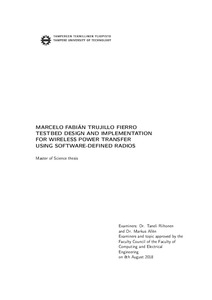Testbed Design and Implementation For Wireless Power Transfer Using Software Defined Radios
Trujillo Fierro, Marcelo Fabián (2018)
Trujillo Fierro, Marcelo Fabián
2018
Electrical Engineering
Tieto- ja sähkötekniikan tiedekunta - Faculty of Computing and Electrical Engineering
This publication is copyrighted. You may download, display and print it for Your own personal use. Commercial use is prohibited.
Hyväksymispäivämäärä
2018-11-05
Julkaisun pysyvä osoite on
https://urn.fi/URN:NBN:fi:tty-201811222733
https://urn.fi/URN:NBN:fi:tty-201811222733
Tiivistelmä
The area of wireless power transfer (WPT) dates back more than a century. This capability to transfer power without wires gives also motive for harvesting resources that have not yet been considered, such as the RF signals that cellular networks employ to send information. Only a while ago the research in the WPT field was focused on improving the elements in the power transmission chains separately. However, in recent years, such closed-loop schemes have emerged that have the potential to improve the efficiency of the entire system by adapting key elements in the chain together, such as the transmitted waveform and the rectenna performance. The scope of the thesis aims to contribute to the ultimate objective of merging information and power transfer in a simultaneous wireless information and power transfer/transmission (SWIPT) network.
The main objective of this thesis is to design and implement a testbed for research on WPT and SWIPT. A closed-loop system is implemented for future scientific experiments for broadcasting a given radio signal and at the same time measuring the total power that an energy receiver will harvest from the transmission. The main element of the testbed is a computer from which master program controlling the transmission, the synchronization, and reading of the harvested voltage. The master program is written in C++ language and is designed to transmit with a USRP and receive voltage readings from the harvesting energy receivers that consist of RF-to-DC converter, ADC and Arduino microcontroller. Results show that the implemented testbed works as planned, and the master program can perform adaptive algorithms. Furthermore, the testbed can be used for experiments for any given waveform meant for communications, WPT, and SWIPT.
The main objective of this thesis is to design and implement a testbed for research on WPT and SWIPT. A closed-loop system is implemented for future scientific experiments for broadcasting a given radio signal and at the same time measuring the total power that an energy receiver will harvest from the transmission. The main element of the testbed is a computer from which master program controlling the transmission, the synchronization, and reading of the harvested voltage. The master program is written in C++ language and is designed to transmit with a USRP and receive voltage readings from the harvesting energy receivers that consist of RF-to-DC converter, ADC and Arduino microcontroller. Results show that the implemented testbed works as planned, and the master program can perform adaptive algorithms. Furthermore, the testbed can be used for experiments for any given waveform meant for communications, WPT, and SWIPT.
